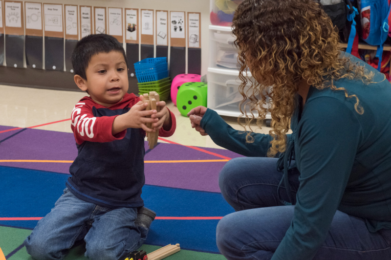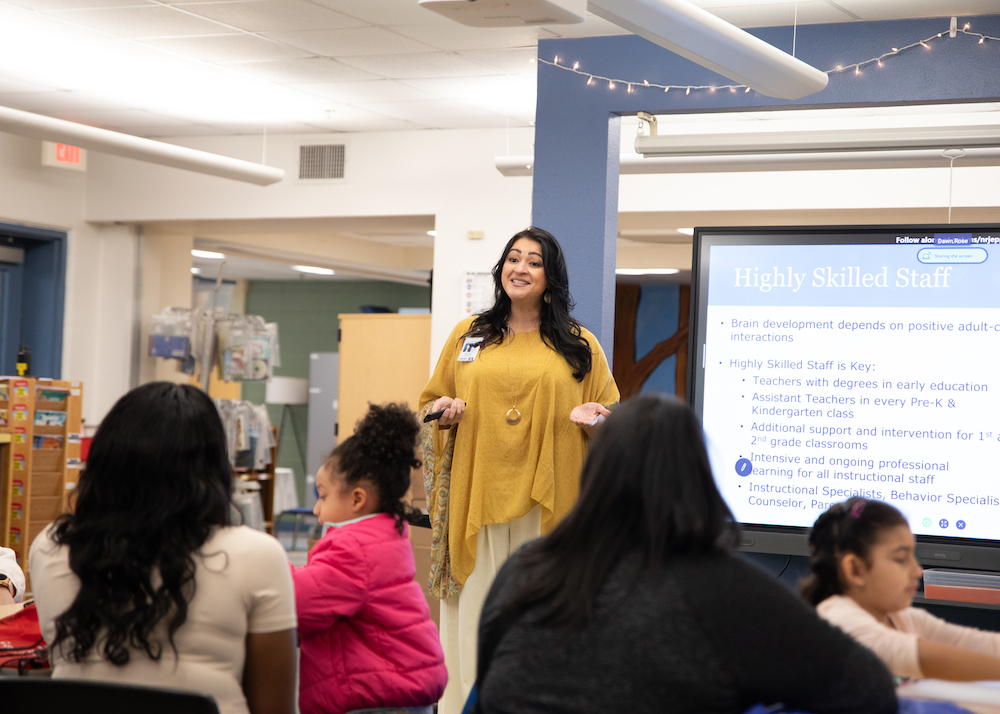Since its inception in 2013, our vision of Pre-K 4 SA has been to develop a world-class workforce through high-quality early childhood education in one generation.
To make this vision a reality, we needed to go beyond the traditional Pre-K curriculum that prepares our children for Kindergarten and concentrate more on preparing them for life. By including a focus on the development of executive function skills, we are preparing our children for success, beyond the preschool classroom to the executive board room and everywhere in between.
Executive functions are a set of cognitive processes or neurologically-based skills (i.e., mental control and self-regulation) that are necessary to perform functions that help us reach our goals.
Executive functions are sometimes referred to as the “air traffic controllers” of the brain. They take in and analyze the incoming data, filter out distractions and allow us to respond in the most effective, appropriate manner.
Many scientists and educators have developed their own working definitions and lists of key executive functions. The three most commonly discussed executive functions include working memory, inhibitory control which includes self-regulation, and cognitive flexibility.
Using the HighScope curriculum, teachers at Pre-K 4 SA also facilitate the development of initiative, emotional control, planning, organization, problem solving, and self-monitoring or evaluating.
Working Memory – This is the ability to hold information long enough to accomplish the task at hand, like following directions, staying focused during small group, or making a plan and following through with it.
Inhibitory Control – This involves the ability to stop a behavior or postpone it until a more appropriate time. For young children, this includes running to get something they want when running is not appropriate in the setting, grabbing an object from another child, or shouting out answers or inappropriate comments.
Cognitive Flexibility – This is sometimes referred to as “shift” because we need to be able to quickly shift from one focus to another and back again without totally breaking our concentration.
Initiative – Children need to be able to take initiative and begin projects, complete tasks on their own and express their own ideas.
Emotional Control – Children should be taught that all emotions are okay to experience and that there are socially acceptable ways of expressing them.
Planning – Children are taught to create and carry out a plan for their work time every day. As the school year progresses, the plans become more detailed and elaborate.
Organization – The classroom is set up for children to encourage independence. All materials and shelves are labeled so children can keep the room neat and tidy. Materials are also arranged by function to help children see how different objects can have a common use or purpose.
Problem Solving – Problem solving can be viewed in two ways. Children can solve problems with materials. They need to be persistent and feel safe in taking risks by trying multiple solutions and thinking outside that proverbial box. The other type of problem solving is with another child. Often the problem involves an object that both children want at the same time. We use six steps of conflict resolution to help the children identify the problem and come up with a solution both parties agree will solve it.
Self-Monitoring – Of course there are multiple opportunities throughout a typical day for children to quickly reflect on a decision, action or piece of work, but HighScope curricula creates dedicated times in daily schedules for such reflection. After children make and carry out their daily plan, they are given the opportunity to reflect on how closely they followed their plan (what worked and what didn’t work), if they changed their plan altogether, and why.
We know people are not born with the skills, but the ability to develop them. Therefore, we take advantage of every opportunity to set the foundation upon which our children can build. Pre-K 4 SA recognizes the importance of these executive function skills to be successful throughout life.
Written by: Erin Burnett, assistant director of Curriculum and Instruction






